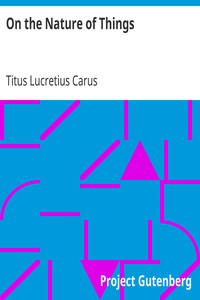| Author |
Lucretius Carus, Titus, 95? BCE-50? BCE |
| Translator |
Leonard, William Ellery, 1876-1944 |
| Uniform Title |
De rerum natura. English
|
| Title |
On the Nature of Things
|
| Note |
Wikipedia page about this book: https://en.wikipedia.org/wiki/De_rerum_natura
|
| Note |
Reading ease score: 56.4 (10th to 12th grade). Somewhat difficult to read.
|
| Credits |
Produced by Levent Kurnaz, and David Widger
|
| Summary |
"On the Nature of Things" by Titus Lucretius Carus is a philosophical treatise written during the late Roman Republic. The work delves into Epicurean philosophy, exploring the nature of the universe, the principles of atomism, and the mechanics of existence, advocating for a worldview grounded in naturalism and free from the burdens of religious superstition. The beginning of the text sets a tone of reverence towards the goddess Venus, positioning Nature as a guiding force. Lucretius introduces themes that will be further examined throughout the work, such as the eternal nature of atoms and the void, the origins of life, and the mechanics behind creation. He calls for an understanding of the natural world based on observable phenomena rather than divine intervention or religious fear, suggesting that the universe is governed by material laws and the interactions of atomic particles. The prologue serves both as an appeal for divine inspiration in his poetic undertaking and as a prelude to a systematic discussion surrounding the fundamental nature of reality, ultimately challenging traditional beliefs regarding gods and the afterlife. (This is an automatically generated summary.)
|
| Language |
English |
| LoC Class |
PA: Language and Literatures: Classical Languages and Literature
|
| Subject |
Didactic poetry, Latin -- Translations into English
|
| Subject |
Philosophy, Ancient -- Poetry
|
| Category |
Text |
| EBook-No. |
785 |
| Release Date |
Jan 1, 1997 |
| Most Recently Updated |
Feb 6, 2013 |
| Copyright Status |
Public domain in the USA. |
| Downloads |
2146 downloads in the last 30 days. |
|
Project Gutenberg eBooks are always free!
|

